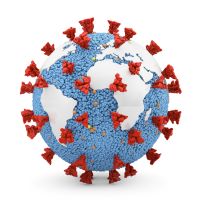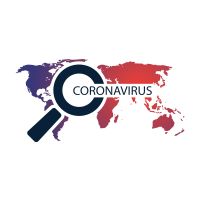GIS and Epidemiology Inform COVID-19 Response
The Geospatial Research, Analysis, and Services Program (GRASP) supports public health efforts to coordinate, manage, and analyze data during the COVID-19 pandemic. GRASP provides data visualization and monitoring in collaboration with national and international partners. Learn about three of many COVID-19 deployments GRASP is engaging in to support the response.
Delivering Technical Expertise for Outbreak Investigation and Contact Tracing Application
Amy Lang, GISP, MCP, BA, GRASP GIS Analyst
Expertise Provided: To aid outbreak investigators and epidemiologists in managing and coordinating outbreak investigations, including the COVID-19 response, the World Health Organization and the Global Outbreak Alert and Response Network (of which CDC is a member) developed an outbreak investigation software platform called Go.Data. Amy Lang, GISP, MCP, a GIS analyst, is the GRASP point of contact for the CDC Go.Data team. As the GIS point of contact for this work, Lang leads development coordination for an interoperability GIS toolkit, advises on best practices for GIS and data management workflows, and provides direct support to countries undergoing implementation.
Along with other Go.Data team members, Lang also responds to requests for information from the United States and Canada, assists with rollout activities and briefings, and supports and facilitates Go.Data super user training. Since the onset of COVID-19 in January 2020, Go.Data has been implemented in 55 countries, within a total of 82 institutions.
Public Health Impact: GRASP provided GIS support and aided in the technical capacity for conducting outbreak investigations, contact tracing and follow-up to inform the response.
Insights with Maps, Data Visualizations, and Research
Lance Owen, ORISE Fellow, PhD, MPhil, GRASP GIS Analyst
Expertise Provided: To support the CDC International Task Force’s COVID-19 response, Lance Owen, PhD, an ORISE fellow in GRASP and a member of the Global Rapid Response Team, provided data visualizations through maps of COVID-19 cases, deaths, and other epidemiological information. Dr. Owen’s efforts informed incident management daily briefings and ad hoc requests from various groups, including the White House Coronavirus Task Force. His assistance with planning and executing specific topics for daily incident management briefings involved research and data procurement, data cleaning, visualization, and drafting descriptive language to accompany the presentations to leaders.
Public Health Impact: GRASP provided quality and prompt data visualizations and research to assist with situational awareness and to inform public health decisions based on GIS and geospatial expertise.
Epidemiology Support for Two Projects: Cruise Ships and One Health Investigations
Esther Kukielka, PhD, DVM, MSc, GRASP EIS Officer
Expertise Provided: To support passenger and crew safety on commercial cruise ships, Epidemic Intelligence Service (EIS) Officer Esther Kukielka, PhD, DVM, MSc, assisted CDC’s Global Migration Task Force (GMTF) as a data manager. Dr. Kukielka ran and maintained the “Enhanced Data Collection During COVID-19 Pandemic Form,” a COVID-19 surveillance system among crew members and passengers who remained on board during the CDC No-Sail Order. This surveillance system monitored case counts and diagnostic testing of COVID-19 and COVID-19-like illness and isolation practices within the cruise ships. Her surveillance data analysis provided critical insights to help leaders determine whether people on board such cruises were allowed to disembark using commercial transportation, allowing for safe travel during COVID-19.
For her role in One Health—a collaborative, multisectoral, and transdisciplinary approach in recognizing the connection between people, animals, and the environment—Dr. Kukielka was the liaison between CDC’s One Health work group, Food Systems work group (specific to COVID-19 response), and CDC’s Environmental Health Task Force (specific to COVID-19 response). Her assistance included updating a COVID-19 environmental health scientific publication tracker; setting up an online COVID-19 and animal shelter questionnaire in REDCap, an online system for designing research databases; serving as the point of contact for the Hurricane Planning working group and the Mass Animal Care subgroup; and aiding in setting up a national animal surveillance system for COVID-19.
Public Health Impact: GRASP’s development of data collection tools, investigation, liaison role, and assistance with a national surveillance system provided the critical epidemiologic actions needed during the emergency response.
GRASP has a strong track record of working with internal and external partners to support deployments across environmental health, infectious diseases, chronic diseases, global health, and emergency preparedness and response. GRASP enables partners to pursue innovative projects that are significantly enhanced by geospatial science and GIS support.


